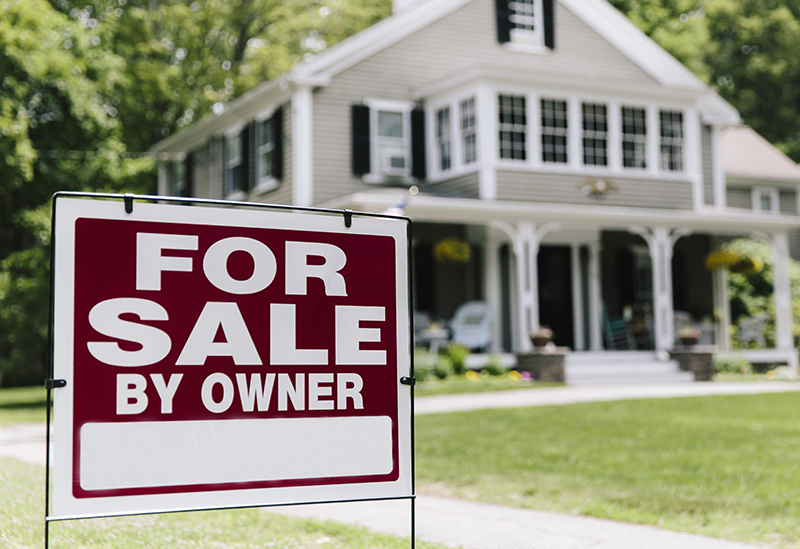The Ultimate Home Buying Guide: A Step-by-Step Checklist for First-Time Buyers

Looking to buy your first home? Congratulations! This is an exciting milestone in your life. However, navigating the world of real estate can be overwhelming, especially for first-time buyers. That's why we've created the ultimate home buying guide to help make the process easier for you.
In this step-by-step checklist, we'll guide you through every stage of the home buying journey, from understanding your financial readiness to finding the perfect property and closing the deal. Whether you're looking for a cozy condo or a spacious family home, our guide will provide you with the essential information and tips you need to make informed decisions.
We understand that every buyer's journey is unique, so we've broken down each step into actionable tips and explained key concepts along the way. With our comprehensive guide, you'll gain the confidence and knowledge to navigate the real estate market with ease.
Don't let uncertainty hold you back from achieving your dream of homeownership. Get started today with our step-by-step checklist for first-time buyers and embark on your exciting new journey to owning a home.
Determining your budget and getting pre-approved for a mortgage
Determining your budget is the first crucial step in the home buying process. Before you start browsing listings, it's essential to understand how much you can afford. Start by evaluating your current financial situation, including your income, expenses, and any existing debts. Take into account your monthly income and expenses to determine how much you can comfortably allocate towards mortgage payments.
Once you have a clear understanding of your finances, it's time to get pre-approved for a mortgage. This involves contacting a lender and providing them with the necessary documentation, such as proof of income, employment history, and credit score. The lender will assess your financial information and determine the maximum loan amount you qualify for. Getting pre-approved not only gives you a better idea of your budget but also strengthens your position as a buyer in the eyes of sellers.
Remember, being pre-approved for a mortgage doesn't mean you have to borrow the maximum amount. Consider your comfort level and long-term financial goals when deciding on the loan amount. Being conservative with your budget can provide you with more flexibility and peace of mind in the future.
Ready to get pre-approved in Central Ohio? Connect with a preferred lender today
Finding the right real estate agent
A knowledgeable and trustworthy real estate agent can be your greatest asset during the home buying journey. They have the expertise and resources to help you find the perfect property that meets your needs and budget. When selecting a real estate agent, consider their experience, track record, and familiarity with the local market.
Start by asking for recommendations from friends, family, or colleagues who have recently purchased a home. You can also research online and read reviews to gain insights into an agent's reputation. Additionally, schedule interviews with prospective agents to gauge their communication style, responsiveness, and understanding of your specific requirements.
A great real estate agent will not only assist you in finding suitable properties but also provide valuable guidance throughout the negotiation and closing process. They can help you navigate complex paperwork, negotiate with sellers, and ensure that all necessary inspections and legal requirements are met. With the right agent by your side, you'll have a trusted advisor who will advocate for your interests and make the entire home buying experience smoother.
Need a great agent to assist you? Meet our agents and let's get started.
Researching and visiting potential neighborhoods
Once you have your budget and real estate agent in place, it's time to research potential neighborhoods. Consider factors such as proximity to work, schools, amenities, and safety when evaluating different areas. Online resources, such as neighborhood guides and real estate websites, can provide you with valuable information about local amenities, crime rates, and school districts.
However, it's equally important to visit the neighborhoods in person. Take the time to explore the area at different times of the day to get a sense of the community and assess if it aligns with your lifestyle. Visit local establishments, talk to residents, and attend any community events happening in the area. This firsthand experience will give you a better understanding of the neighborhood's atmosphere and whether it feels like a place you can call home.
When conducting neighborhood visits, pay attention to factors such as noise levels, traffic, and the overall condition of the properties. Take notes and compare your observations with your initial expectations. This will help you make a more informed decision when it comes to narrowing down your choices and selecting the right neighborhood for your future home.
Making a list of must-haves and deal-breakers for your new home
Before you start searching for available properties, it's essential to create a list of must-haves and deal-breakers for your new home. This will help you stay focused and avoid getting overwhelmed by the multitude of options available.
Start by considering your current and future needs. Think about the number of bedrooms and bathrooms you require, the size of the kitchen, and any specific features or amenities you desire. Do you need a backyard for your children or pets? Are you looking for a home with a garage or dedicated parking space? Consider your lifestyle and prioritize the features that are most important to you.
It's also important to identify deal-breakers, which are factors that would make a property unsuitable for you regardless of its other qualities. This could include factors such as a busy road nearby, a lack of natural light, or a layout that doesn't suit your preferences. By clearly defining your must-haves and deal-breakers, you can streamline your search and ensure that you're only considering properties that meet your criteria.
Searching for available properties and attending open houses
With your list of criteria in hand, it's time to start searching for available properties. Real estate websites, online listings, and your real estate agent's expertise will be invaluable during this phase. Utilize search filters to narrow down your options based on your desired location, price range, and specific features.
As you browse through listings, make sure to carefully read the property descriptions, view photos, and review any virtual tours or videos available. This will give you a preliminary idea of whether a property meets your requirements or warrants further investigation. Keep track of the properties that catch your interest and make notes about what you like or dislike about each one.
Attending open houses is another important step in the home buying process. Open houses provide an opportunity to view a property in person, ask questions, and assess its condition firsthand. Take your time during the open house to thoroughly explore each room, paying attention to details such as the condition of the flooring, walls, and appliances. Don't hesitate to ask the listing agent any questions you may have about the property, neighborhood, or nearby amenities.
Making an offer and negotiating the purchase price
Once you've found a property that meets your criteria and feels like a potential home, it's time to make an offer. Your real estate agent will guide you through this process and help you determine a competitive yet reasonable offer price.
Consider factors such as the property's condition, market conditions, and comparable sales in the area when determining your offer price. Your agent will provide you with a comparative market analysis (CMA) to help you understand the property's value in relation to recent sales of similar properties. This analysis will give you a solid foundation for negotiating a fair purchase price with the seller.
Negotiating the purchase price involves a back-and-forth between you and the seller. Your agent will handle the negotiations on your behalf, presenting your offer and any counteroffers to the seller's agent. Throughout this process, it's important to maintain open communication with your agent and be flexible when it comes to negotiations. Remember, the goal is to reach an agreement that satisfies both parties and allows you to secure your dream home at a fair price.
Conducting inspections and addressing any issues
Once your offer has been accepted, it's crucial to conduct inspections to ensure the property is in good condition and free from any major issues. Your real estate agent can help you schedule inspections for areas such as the home's structure, plumbing, electrical systems, and pest control. Depending on the location and property type, you may also need additional inspections, such as radon testing or mold inspection.
Review the inspection reports carefully and discuss any findings with your agent. If there are any significant issues discovered during the inspections, you have the option to negotiate repairs or credits with the seller. Your agent will guide you through this process and help you reach an agreement that protects your interests.
It's important to address any necessary repairs or issues before proceeding with the purchase. This will ensure that you're aware of the property's condition and can make an informed decision about whether to proceed with the purchase or renegotiate the terms.
Finalizing the mortgage and closing the deal
With the inspections completed and any necessary repairs addressed, it's time to finalize your mortgage and move forward with closing the deal. Your lender will work with you to complete the necessary paperwork and finalize the mortgage terms.
During this stage, it's crucial to stay organized and provide any requested documentation promptly. Be prepared to review and sign various legal documents, including the loan agreement, promissory note, and closing disclosure. Your lender will also arrange for a title search and title insurance to ensure that there are no liens or ownership disputes on the property.
Prior to closing, you'll have the opportunity to conduct a final walkthrough of the property to ensure that it's in the same condition as when you made the offer. This is your last chance to address any concerns before officially taking ownership of the property.
On the day of closing, you'll meet with the seller, their agent, your agent, and a representative from the title company or attorney's office to finalize the transaction. During this meeting, you'll review and sign the necessary documents, including the deed and mortgage agreement. You'll also pay any remaining closing costs, such as attorney fees, appraisal fees, and property taxes.
Once all the paperwork is signed and funds are transferred, you'll receive the keys to your new home. Congratulations, you're officially a homeowner!
Moving into your new home and settling in
After closing the deal, it's time to move into your new home and make it your own. Begin by planning your move and coordinating with professional movers or friends and family who can assist you. Make a checklist of tasks such as transferring utilities, changing your address, and setting up any necessary services.
Once you're settled into your new home, take the time to explore the neighborhood and get to know your neighbors. Familiarize yourself with the local amenities, such as grocery stores, restaurants, parks, and recreational facilities. This will help you feel more connected to your new community and make the transition smoother.
Consider personalizing your new space by adding your personal touch, whether through decor, paint, or furniture. Take your time to create a comfortable and inviting environment that reflects your style and makes you feel at home.
Remember, homeownership is a long-term commitment. Take pride in your new home and continue to maintain it through regular upkeep and repairs. Owning a home is not just about the initial purchase; it's about creating a space that brings you joy and serves as a foundation for your future.
Conclusion
Buying your first home can be both exciting and challenging. However, with the help of our step-by-step checklist, you'll be well-prepared to navigate the home buying journey with confidence. From determining your budget to moving into your new home, each step is essential in ensuring a successful and fulfilling homeownership experience.
Remember, this guide is just the beginning. Real estate markets and regulations can vary, so it's always a good idea to consult with local professionals and experts to ensure you have the most up-to-date information.
Congratulations on taking the first step towards homeownership. Now, armed with this comprehensive guide, you're ready to embark on your exciting new journey to owning a home. Good luck!
Categories
- All Blogs (45)
- Airbnb (2)
- Columbus, OH (4)
- Downsizing (1)
- Dublin, OH (1)
- Expired (1)
- First-Time Buyers (7)
- FSBO (2)
- Hilliard, OH (1)
- Home Buying (15)
- Home Selling (12)
- Intel (1)
- Interest Rates (1)
- Investing (1)
- Lewis Center, OH (1)
- Lifestyle (12)
- Mortgage (5)
- Neighborhoods (8)
- New Albany, OH (2)
- Powell, OH (1)
- Relocating to Columbus (1)
- Short-Term Rentals (2)
- Things To Do (2)
- Tips & Tricks (12)
- Upper Arlington, OH (1)
- Worthington, OH (1)
Recent Posts












